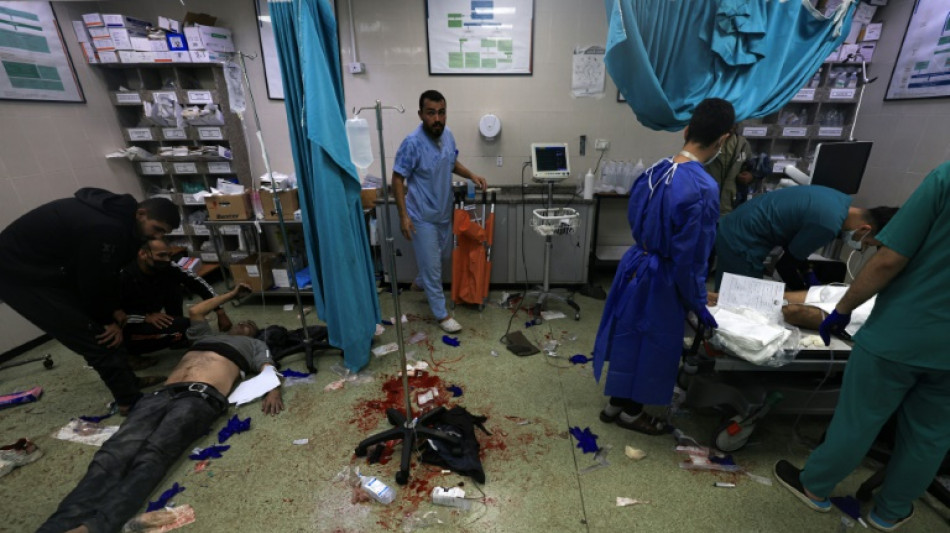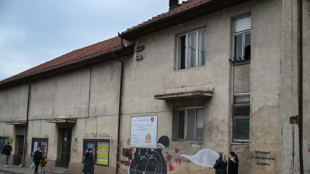
-
 England snap 15-year losing streak to win chaotic 4th Ashes Test
England snap 15-year losing streak to win chaotic 4th Ashes Test
-
Thailand and Cambodia agree to 'immediate' ceasefire

-
 Closing 10-0 run lifts Bulls over 76ers while Pistons fall
Closing 10-0 run lifts Bulls over 76ers while Pistons fall
-
England 77-2 at tea, need 98 more to win chaotic 4th Ashes Test

-
 Somalia, African nations denounce Israeli recognition of Somaliland
Somalia, African nations denounce Israeli recognition of Somaliland
-
England need 175 to win chaotic 4th Ashes Test

-
 Cricket Australia boss says short Tests 'bad for business' after MCG carnage
Cricket Australia boss says short Tests 'bad for business' after MCG carnage
-
Russia lashes out at Zelensky ahead of new Trump talks on Ukraine plan

-
 Six Australia wickets fall as England fight back in 4th Ashes Test
Six Australia wickets fall as England fight back in 4th Ashes Test
-
Man Utd made to 'suffer' for Newcastle win, says Amorim

-
 Morocco made to wait for Cup of Nations knockout place after Egypt advance
Morocco made to wait for Cup of Nations knockout place after Egypt advance
-
Key NFL week has playoff spots, byes and seeds at stake

-
 Morocco forced to wait for AFCON knockout place after Mali draw
Morocco forced to wait for AFCON knockout place after Mali draw
-
Dorgu delivers winner for depleted Man Utd against Newcastle

-
 US stocks edge lower from records as precious metals surge
US stocks edge lower from records as precious metals surge
-
Somalia denounces Israeli recognition of Somaliland

-
 The Cure guitarist and keyboard player Perry Bamonte dies aged 65
The Cure guitarist and keyboard player Perry Bamonte dies aged 65
-
Draper to miss Australian Open

-
 Police arrest suspect after man stabs 3 women in Paris metro
Police arrest suspect after man stabs 3 women in Paris metro
-
Former Montpellier coach Gasset dies at 72

-
 Trump's Christmas gospel: bombs, blessings and blame
Trump's Christmas gospel: bombs, blessings and blame
-
Russia lashes out at Zelensky ahead of new Trump meeting on Ukraine plan

-
 Salah helps Egypt beat South Africa and book last-16 place
Salah helps Egypt beat South Africa and book last-16 place
-
Australia's Ikitau facing lengthy lay-off after shoulder injury

-
 Another 1,100 refugees cross into Mauritania from Mali: UN
Another 1,100 refugees cross into Mauritania from Mali: UN
-
Guardiola proud of Man City players' response to weighty issues

-
 Deadly blast hits mosque in Alawite area of Syria's Homs
Deadly blast hits mosque in Alawite area of Syria's Homs
-
The Jukebox Man on song as Redknapp records 'dream' King George win

-
 Liverpool boss Slot says Ekitike reaping rewards for greater physicality
Liverpool boss Slot says Ekitike reaping rewards for greater physicality
-
Judge jails ex-Malaysian PM Najib for 15 more years after new graft conviction

-
 Musona rescues Zimbabwe in AFCON draw with Angola
Musona rescues Zimbabwe in AFCON draw with Angola
-
Zelensky to meet Trump in Florida on Sunday

-
 'Personality' the key for Celtic boss Nancy when it comes to new signings
'Personality' the key for Celtic boss Nancy when it comes to new signings
-
Arteta eager to avoid repeat of Rice red card against Brighton

-
 Nigeria signals more strikes likely in 'joint' US operations
Nigeria signals more strikes likely in 'joint' US operations
-
Malaysia's former PM Najib convicted in 1MDB graft trial

-
 Elusive wild cat feared extinct rediscovered in Thailand
Elusive wild cat feared extinct rediscovered in Thailand
-
Japan govt approves record budget, including for defence

-
 Seoul to ease access to North Korean newspaper
Seoul to ease access to North Korean newspaper
-
History-maker Tongue wants more of the same from England attack

-
 Australia lead England by 46 after 20 wickets fall on crazy day at MCG
Australia lead England by 46 after 20 wickets fall on crazy day at MCG
-
Asia markets edge up as precious metals surge

-
 Twenty wickets fall on day one as Australia gain edge in 4th Ashes Test
Twenty wickets fall on day one as Australia gain edge in 4th Ashes Test
-
'No winner': Kosovo snap poll unlikely to end damaging deadlock

-
 Culture being strangled by Kosovo's political crisis
Culture being strangled by Kosovo's political crisis
-
Main contenders in Kosovo's snap election

-
 Australia all out for 152 as England take charge of 4th Ashes Test
Australia all out for 152 as England take charge of 4th Ashes Test
-
Boys recount 'torment' at hands of armed rebels in DR Congo

-
 Inside Chernobyl, Ukraine scrambles to repair radiation shield
Inside Chernobyl, Ukraine scrambles to repair radiation shield
-
Bondi victims honoured as Sydney-Hobart race sets sail


Chaos in south Gaza hospitals after new Israeli strikes
Patients lie on cold, bloodstained floors in hospitals filled to overflowing. Some scream in pain, but others lie silently, deathly white, too weak even to cry out.
Hospitals in the southern Gaza Strip have descended into chaos since the resumption of the war between the Palestinian militant group Hamas and Israel.
After eight weeks of war, interrupted only by one seven-day pause that ended on Friday, the doctors are exhausted.
Fuel reserves have almost run dry because of Israel's blockade of the territory, so doctors are forced to choose when and where across their hospitals to run generators.
According to the United Nations, not a single hospital in the territory's north can currently operate on patients.
The most seriously wounded are transferred daily to the south by convoys organised by the International Committee of the Red Cross.
But even there, the UN says, the 12 remaining hospitals are only "partially functional".
Abdelkarim Abu Warda and his nine-year-old daughter Huda have just arrived at Deir al-Balah Hospital aboard one of the ICRC convoys.
On Friday, after the truce ended, an Israeli strike hit their house in the vast Jabalia refugee camp in the north.
Huda was wounded in the head. "She had a brain haemorrhage -- she was placed on a ventilator," her father told AFP.
Since then, "she hasn't responded to anything", he says, lifting up the little girl's arms.
"She doesn't answer me any more," he repeats, sobbing.
- No words -
It is daybreak and the first prayers for the dead are being performed.
A few dozen men gather in front of white body bags lined up on the ground.
Between two larger bags lies the small shroud of a child, close to his or her parents even in death.
Women in tears crouch down to touch a face or kiss a loved one for one last time before the bodies are carefully loaded into the back of a pickup.
"It's Adam going... and there is Abdullah," says one woman, weeping.
At the Nasser hospital in Khan Yunis, the largest medical facility in southern Gaza, the story is the same.
World Health Organization chief Tedros Adhanom Ghebreyesus said on Sunday he was unable to "find words strong enough" to express his concerns about the conditions there.
Members of a WHO team who visited found it packed with 1,000 patients, three times its capacity.
Patients were being treated on the floor "screaming in pain", with "countless people... seeking shelter, filling every corner", the WHO chief wrote.
Israel unleashed its air and ground campaign in response to Hamas's October 7 attack on southern Israel, which killed around 1,200 people and saw some 240 kidnapped, Israeli officials say.
The Hamas government that runs Gaza says the Israeli campaign has killed more than 15,500 people -- including 280 medical staff -- since it began eight weeks ago.
- 'Saw the bomb fall' -
Israel, which has vowed to eliminate Hamas, says it is now focusing on the southern city of Khan Yunis.
The army drops warning leaflets on neighbourhoods due to be targeted each day, telling residents that a "terrible attack is imminent" and ordering them to leave.
Each day, too, the warnings move closer to the hospital.
With each new explosion that shakes the city, more casualties arrive, often in private cars.
Staff race out with stretchers which are often still stained with blood from the previous patient.
Some bodies arrive unaccompanied, and so cannot even be identified.
In the corridors, families, the wounded and medical staff all jostle together.
Some tend to the patients, sliding a sweater or a T-shirt under the head of an wounded person lying on the hard floor.
Ehab al-Najjar, a man with several family members both alive and dead at the hospital, lets his anger explode.
"I came home and saw the bomb fall on our house. Women, children died. What did they do to deserve this?" he screams.
J.Oliveira--AMWN



